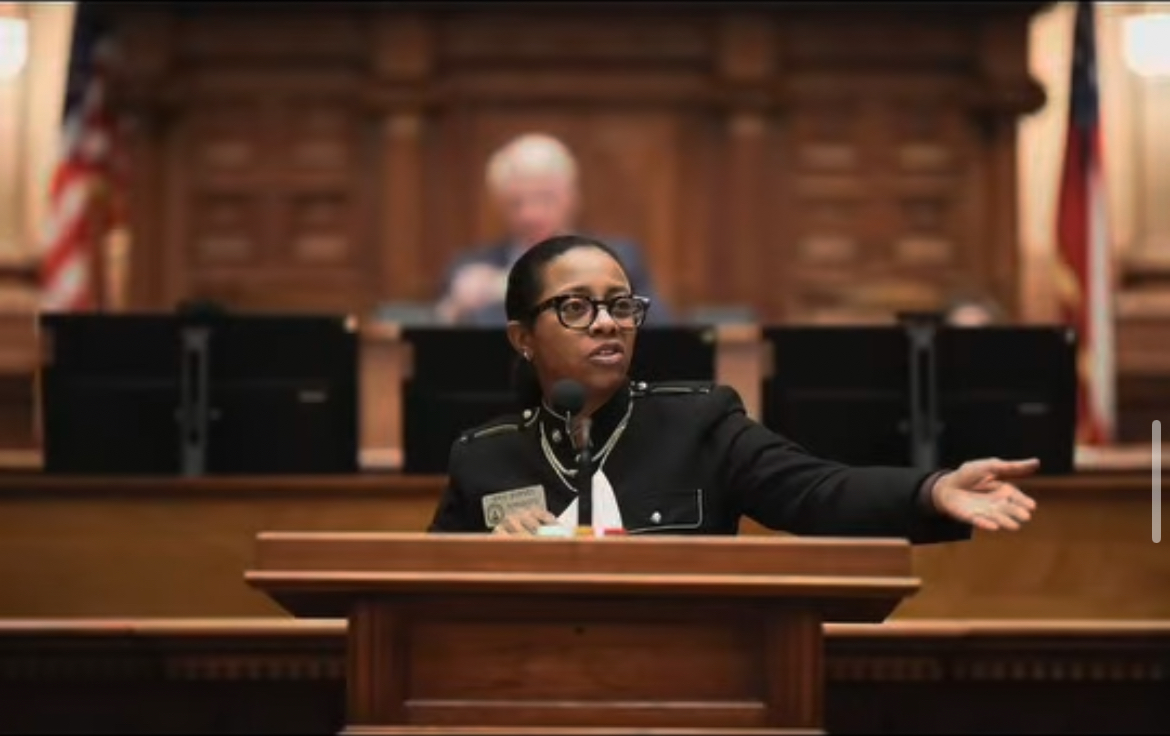
When she first set foot in the new Maynard Jackson High School on Jan. 3, new APS Board member Leslie Grant was blown away.
“It really is phenomenal,” Grant said.
The $48.3 million renovation includes a new media center, a rooftop garden and a new football field and track. Additionally, every room in the new building has some source of natural light.
“Around noon, you can turn the lights off because there’s so much natural lighting in the building,” Jackson principal Stephanie Johnson said.
The changes are not just physical, though. Jackson, which has struggled with low test scores and high rates of student attrition, is experiencing a rebirth, according to Local School Council member Chris Murphy.
“There’s been never-ending steps to change the culture here,” Murphy said.
These steps include the addition of Principal Johnson in November of 2012, the introduction of the International Baccalaureate program and an increase in parental involvement. Murphy said the school has come a long way since his daughter entered as a freshman in 2011.
“I knew coming in what shape the school was in academically because of state DOE [Department of Education] reports, and it was not looking good,” Murphy said, citing “abysmal” test scores and a graduation rate of around 30 percent.
The school was performing so poorly that it got placed at “priority level,” meaning it was in the bottom 5 percent of Georgia high schools. The designation was not all bad, however, as it gave Johnson more autonomy in firing teachers, Murphy said.
“Over the summer [of 2013], she replaced 47 staff [members],” Murphy said. “She replaced more staff than the rest of the system.”
Another factor that fueled the school’s resurgence was the redistricting process of 2012. Murphy originally thought the Candler Park area would be rezoned to Jackson, giving him more allies in the fight to improve the school. Many Candler Park residents, however, were vehemently opposed to sending their children to Jackson, according to Murphy.
“I don’t want them anymore,” Murphy said. “I will brick up the Rocky Ford underpass myself to make sure they do not come down here.”
Despite the friction between neighborhoods, Murphy said, the redistricting process turned out to be a boon for Jackson because it brought parents together.
“Redistricting proved to be the best thing that has ever happened to this cluster because we had these huge meetings, and while parents were yelling back and forth at the administration, at each other, we all met each other,” Murphy said.
Although Jackson appears to be turning around, several other schools in the cluster are still struggling, particularly Coan and King, the middle schools that feed into Jackson. These schools have faced declining student enrollment and parent involvement, largely due to the abundance of charter schools in the cluster. In fact, Coan’s parental involvement has dropped to the point where the school’s PTA was dissolved.
Because of the lack of parental engagement at Coan, parents at Toomer, Whitefoord and Burgess-Peterson—the three elementary schools that feed into Coan—started a movement toward converting the three schools into K-8 “elemiddle” schools. That way, parents argue, students can remain on the same campus through eighth grade.
“We thought that closing the gap on that transition by keeping children in the same school, with the same cohort of students and involved parents … would provide an environment where students would be more likely to succeed,” Toomer PTA president Stacey Martin said.
APS Superintendent Erroll Davis, however, rejected the plan on Feb. 3, arguing it would cost too much to create three separate K-8 schools in East Atlanta. Martin said that parents in the cluster thought they were denied a voice in the decision.
“The superintendent has promised the community a recommendation for the board to vote on Feb. 3, so we all anticipated a conversation. … He released his recommendations not to move forward with K-8 without that being on the agenda,” Martin said, “so we have a community that continues to distrust APS and is asking for the data that the unexpected change in the recommendation is based on.”
Davis also argued during the Feb. 3 school board meeting that APS should strengthen the existing middle schools in the cluster. Martin says that one of the reasons these middle schools have been struggling is that they are forced to compete with the cluster’s three charter schools—Atlanta Neighborhood Charter School, Charles R. Drew Charter School and Wesley International Academy—for students and resources.
“You have a lot of parents who don’t want to move their kids around; they want to put them somewhere stable, and that’s what the charter schools have provided, is a stable K-8 vision,” Martin said. “[Charter schools] have been able to grow their schools, grow their enrollment. They have a lot of resources, and a lot of programming available that the Atlanta Public Schools just have not been able to compete with.”
According to data from the Georgia DOE from the 2010-2011 school year, the Jackson cluster had the highest percentage of charter school students out of any cluster in the district, with 37 percent of students who attend a school in the cluster attending a charter school. Drew Charter principal Don Doran insists that the presence of charter schools in the cluster is actually a good thing.
“We think choice is good, because a parent can say, ‘This is what works for my student,’” Doran said. “We want to make sure that whatever you choose in the Jackson cluster, and there’s 19 of us, it’s a great choice.”
Matt Underwood, the executive director of ANCS, agrees.
“One of the things that having charter schools can show parents as well as the district as a whole is that giving some of the same freedom and autonomy to traditional schools will help those schools as well,” Underwood said.
Grant, whose daughter is a ninth- grader at Jackson, agrees that the plethora of charter schools in the cluster can be positive for parents and students, especially with the construction of Drew Charter’s new $70 million high school campus coming at no cost to the district.
“I don’t see that as being anything but a win-win for our community,” Grant said.
Grant acknowledged, however, that the expansion of charter schools in the cluster can come at a cost to enrollment at the traditional public schools, like Coan.
“In the short term it is destabilizing, and we have to figure out what we’re going to do—middle school-wise—to make sure that everybody is happy,” Grant said.
Underwood said he has noticed that more parents have been sending their children to Jackson after graduating from ANCS.
“We’ve got a number of our parents, both from ANCS and some other charter schools in the area, who have been pretty actively involved in the PTA at Jackson, and really helping to provide support for the new principal there,” Underwood said. “I think that that’s encouraging, that people are really interested and invested in making Maynard Jackson the high school for this cluster.”
Grant thinks that despite the progress that needs to be made with the middle schools, Jackson’s revival will benefit the cluster as a whole.
“I think Jackson is going to become a school of choice, and it’s going to become a school people want to go to,” Grant said.












